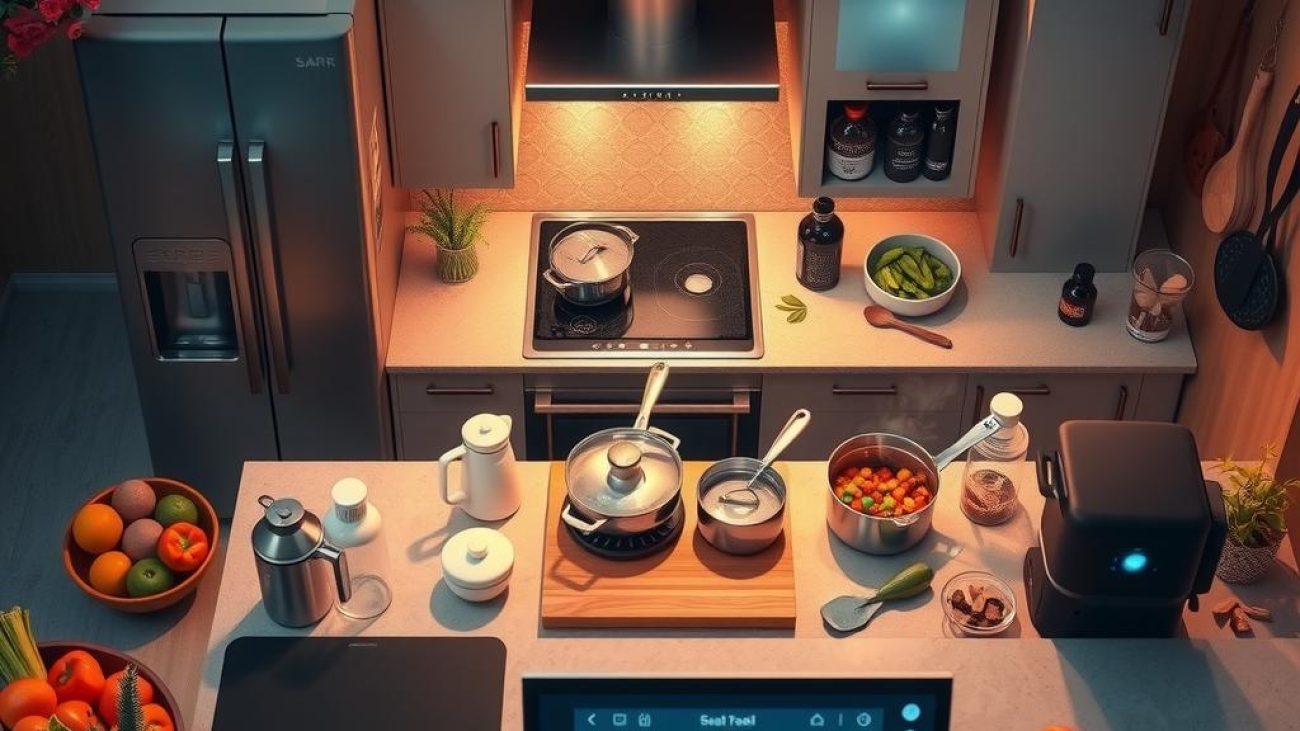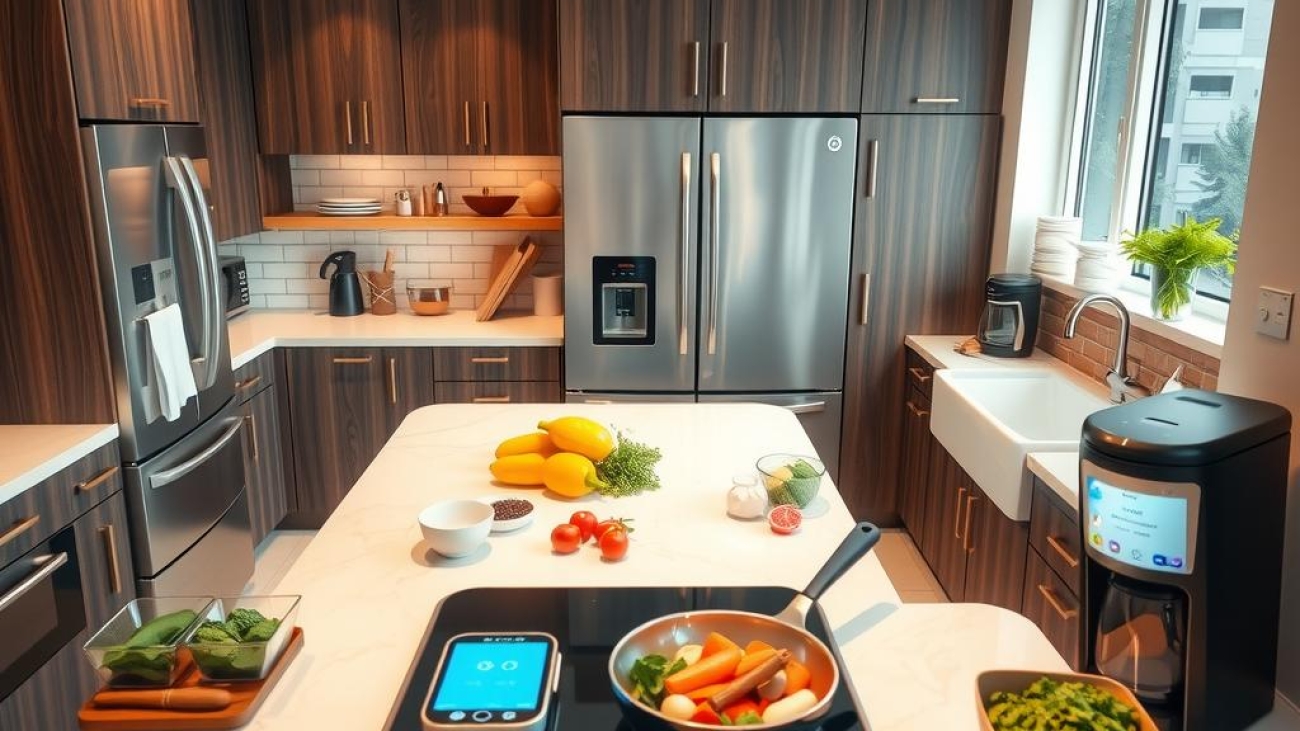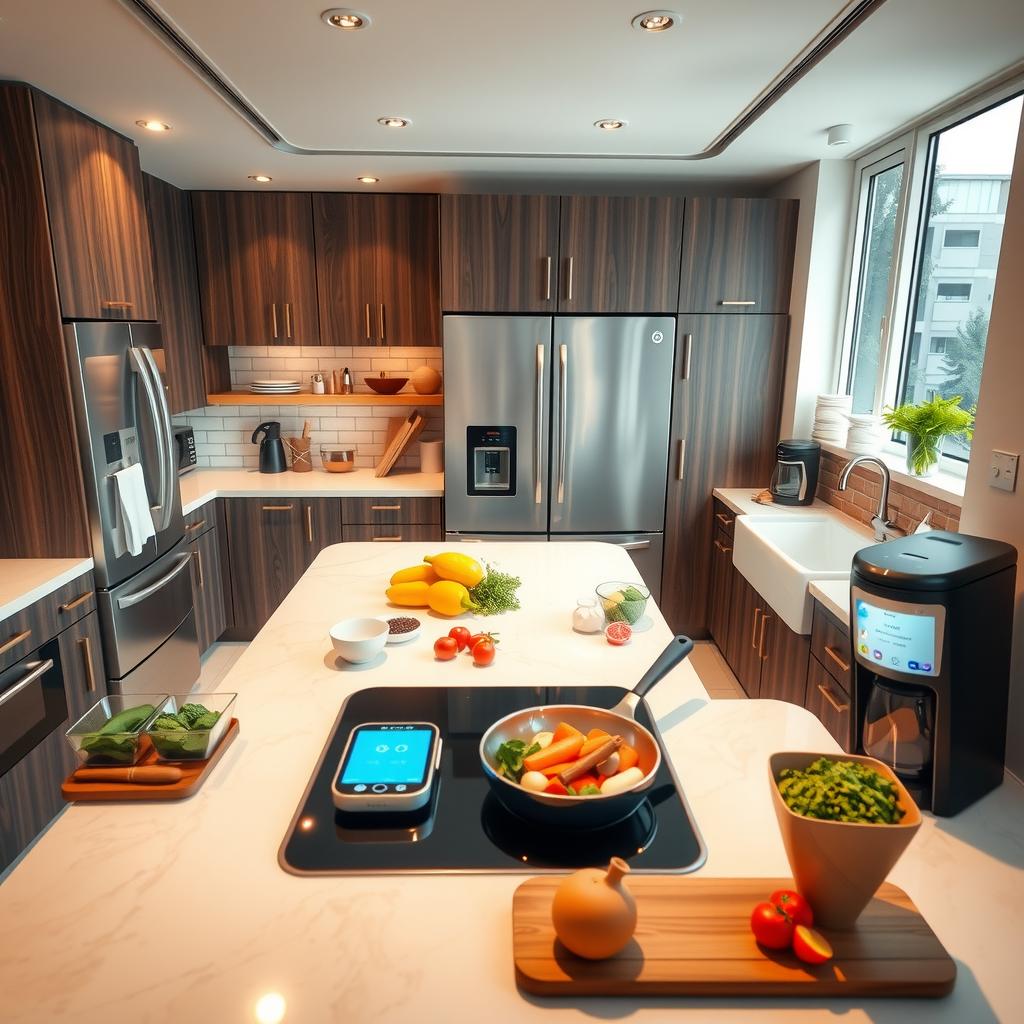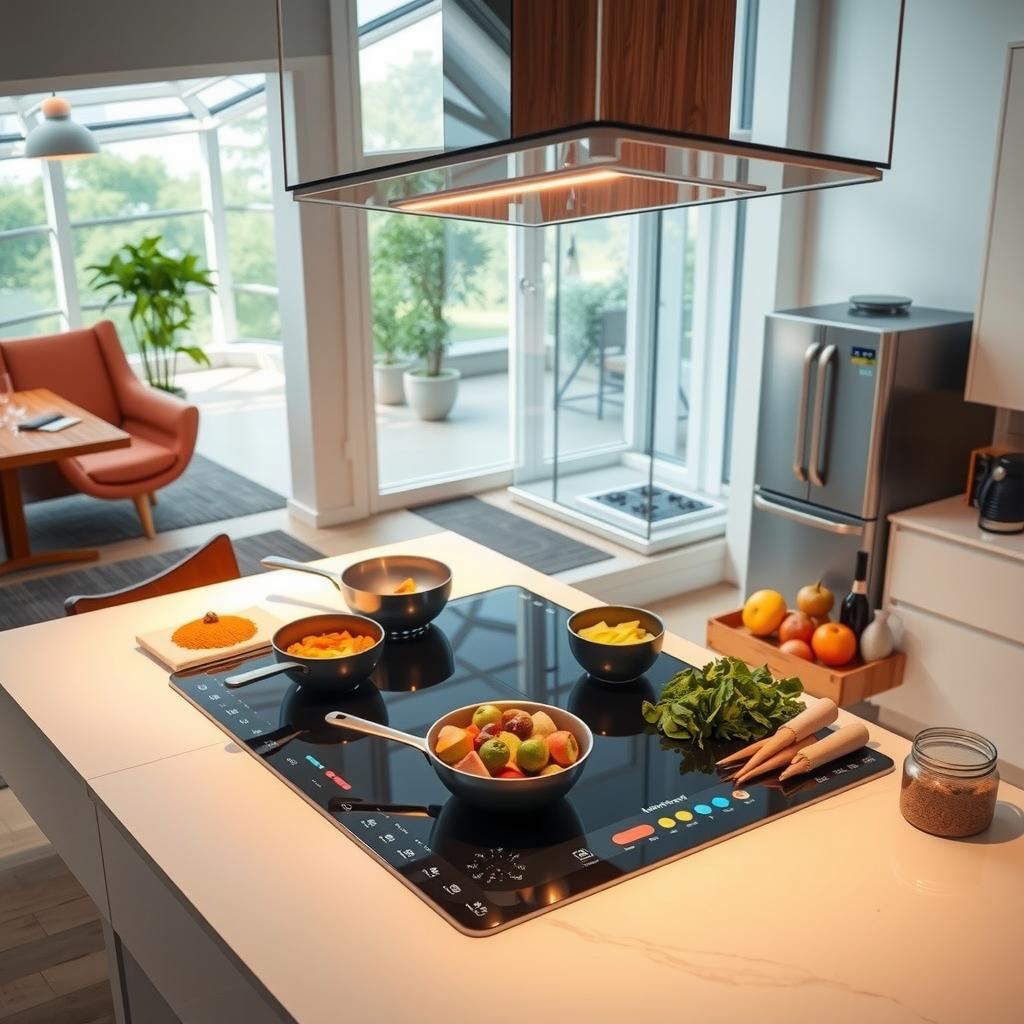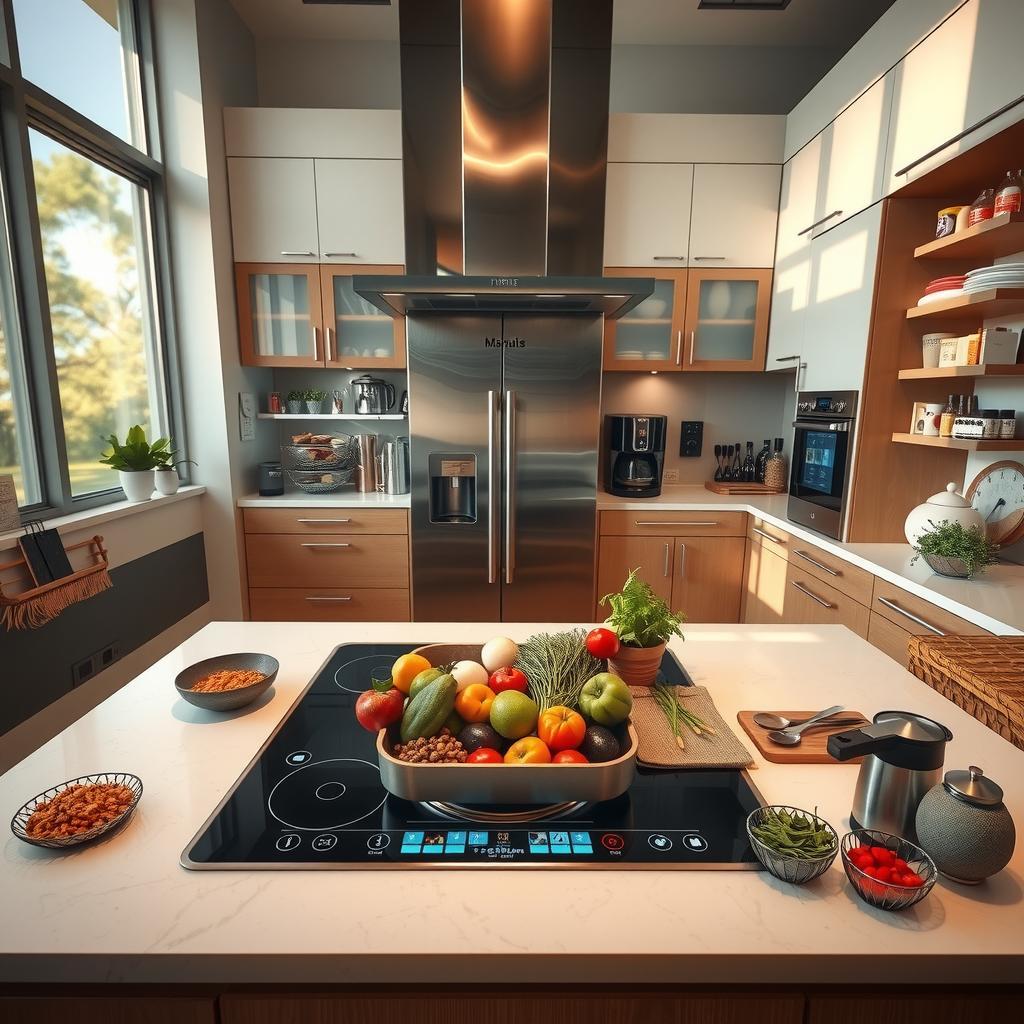In an era where technology permeates every aspect of daily life, the emergence of Smart Kitchen Appliances marks a significant stride in modern cooking solutions. These innovative devices leverage the power of IoT in the kitchen to transform how individuals prepare meals, streamline kitchen tasks, and enhance culinary creativity. Smart refrigerators play a pivotal role in this connected cooking revolution by offering features such as inventory tracking that allows users to manage their groceries more efficiently. With real-time updates on food supplies, families can reduce waste and plan meals with newfound ease.
Equally impressive are smart ovens equipped with remote control features that enable home chefs to monitor cooking progress from anywhere within or outside their homes. Imagine starting dinner while still at work, adjusting temperatures and settings through a smartphone app—all made possible by these advanced Smart Kitchen Appliances. This level of convenience not only saves time but also ensures perfectly cooked dishes every time.
Moreover, smart coffee makers have reshaped morning routines by integrating seamlessly into existing home automation devices; they can be programmed to brew coffee at specific times or activated remotely for those who crave a fresh cup upon waking up. The recipe integration capabilities available through various smart kitchen appliances further enhance the user experience—guiding cooks step-by-step through complex recipes while automatically adjusting cooking parameters based on chosen ingredients.
As consumers increasingly seek efficiency without compromising quality, it’s clear that Smart Kitchen Appliances are ushering in an age of intelligent design and functionality within our kitchens. Whether it’s using voice commands to instruct a smart oven or employing sophisticated apps for meal planning, these technological advancements reflect a broader trend towards connected living where convenience meets culinary expertise. Embracing such innovations enables households not only to keep pace with contemporary lifestyles but also opens doors to exploring new gastronomic horizons effortlessly.
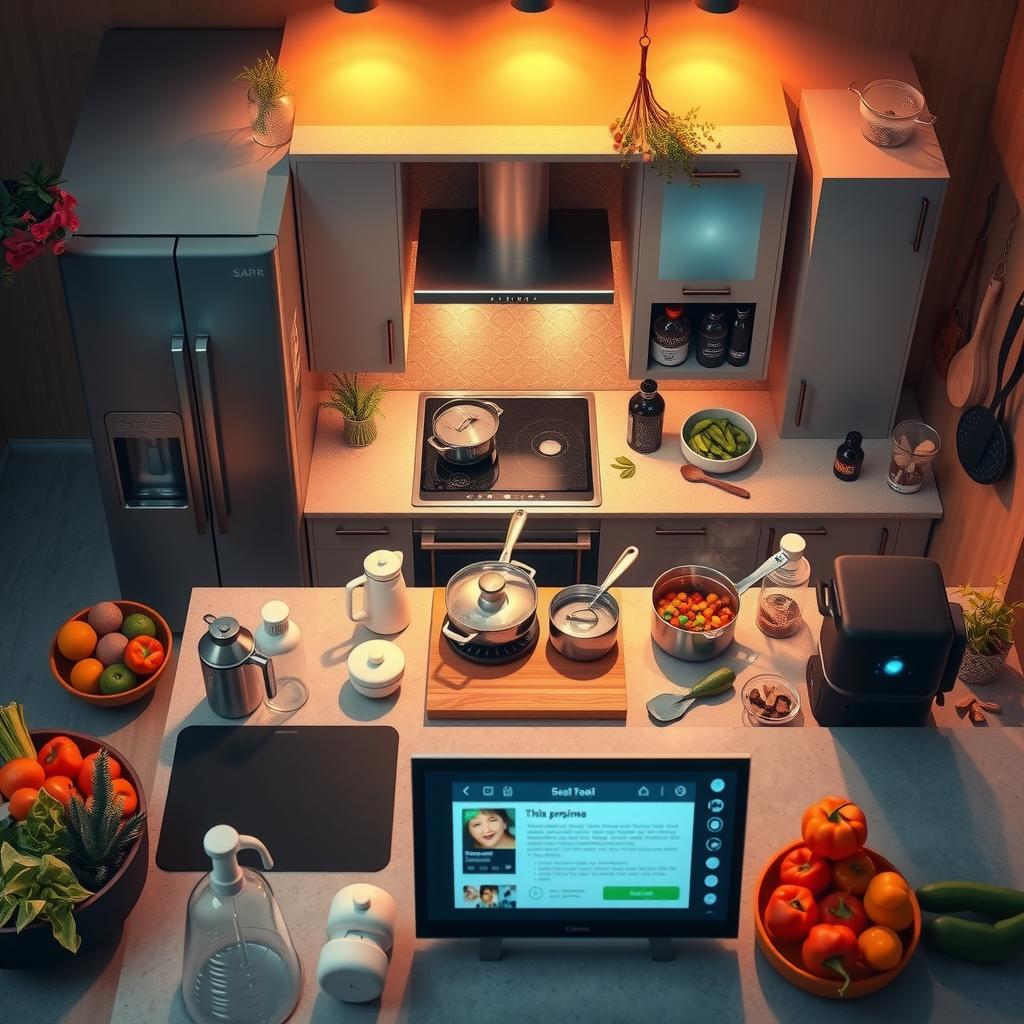
Key points:
-
The Evolution of Smart Refrigerators: Smart Kitchen Appliances like smart refrigerators are redefining food storage and management in the modern home. These advanced devices come equipped with features such as inventory tracking, which allows users to monitor their food supplies in real-time. By integrating with mobile apps, these refrigerators can send alerts when items are running low or nearing expiration, thereby minimizing waste and enhancing meal planning efficiency.
-
Innovations in Smart Ovens: The introduction of smart ovens has brought a new level of convenience to cooking. With capabilities for remote control, users can preheat their oven from anywhere using a smartphone app. This integration also includes recipe features that allow users to send cooking instructions directly to the oven, ensuring precision in temperature and timing while facilitating an effortless cooking experience through enhanced connected cooking technology.
-
Advancements with Smart Coffee Makers: The realm of coffee brewing has been transformed by smart coffee makers, which exemplify how kitchen technology is evolving. These appliances often feature programmable settings that can be adjusted remotely via smartphones, allowing enthusiasts to wake up to freshly brewed coffee every morning. Additionally, many models offer integration with other home automation devices, enabling seamless operation within the broader ecosystem of modern cooking solutions focused on convenience and customization.
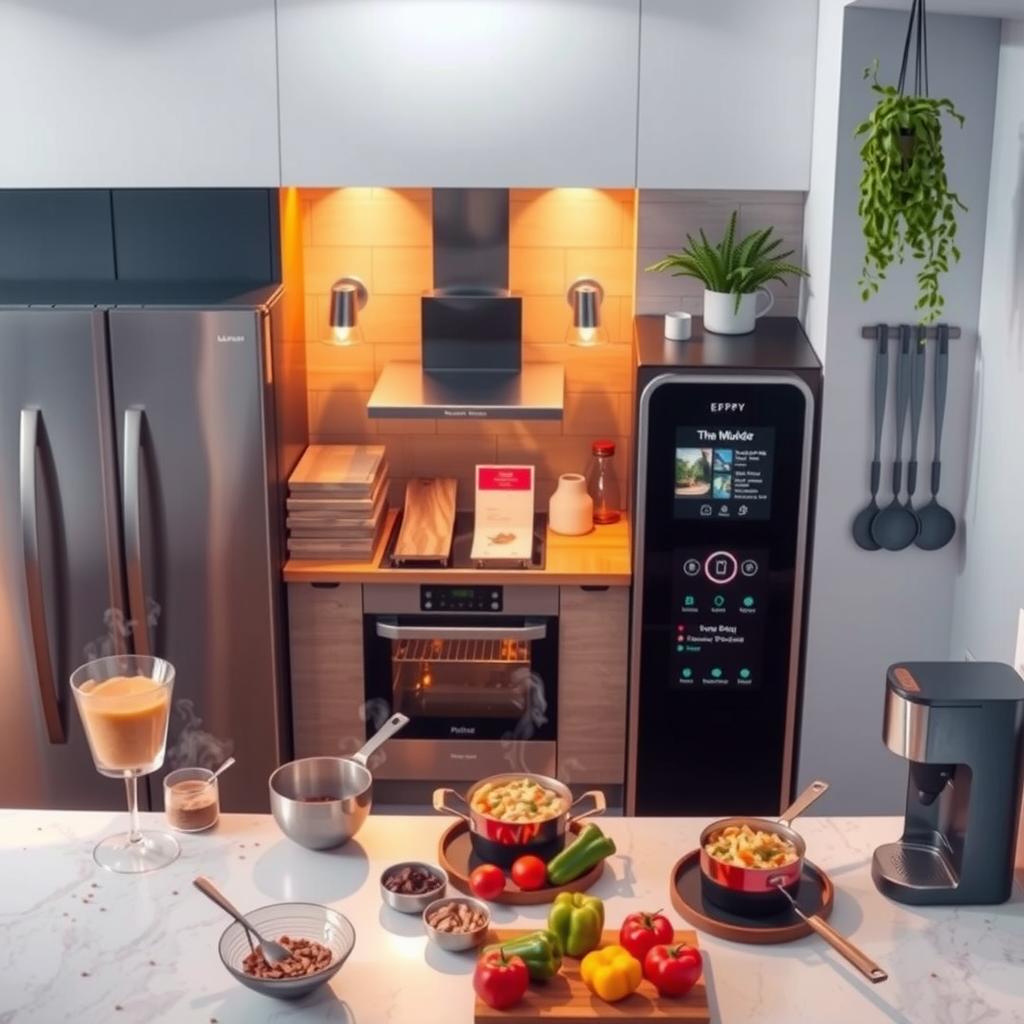
The Evolution of Culinary Technology
How Smart Kitchen Appliances are Shaping Modern Cooking Experiences
The culinary landscape has witnessed a remarkable transformation with the advent of Smart Kitchen Appliances. These innovative devices leverage technology to enhance the cooking experience, making it more efficient, enjoyable, and accessible. Imagine a kitchen where your oven communicates with your refrigerator or where you can start brewing coffee from the comfort of your couch—this is not science fiction but rather the reality brought forth by connected cooking solutions. With smart refrigerators equipped with inventory tracking capabilities, users can easily monitor their food supplies, ensuring nothing goes to waste while also allowing them to plan meals effectively based on available ingredients. Moreover, smart ovens offer features such as precise temperature control and remote monitoring that enable home cooks to achieve professional-quality results without needing extensive culinary training.
Convenience at Your Fingertips
The Role of IoT in Enhancing Culinary Efficiency
The integration of Internet of Things (IoT) technology into everyday cooking appliances has revolutionized how individuals approach meal preparation. Smart Kitchen Appliances serve as home automation devices that simplify various tasks through intuitive controls and app connectivity. For instance, many modern coffee makers now allow users to schedule brew times via mobile applications or voice commands through virtual assistants like Alexa or Google Assistant. This level of convenience means no longer rushing around in the morning; instead, one can wake up to freshly brewed coffee awaiting them—a true luxury for busy households. Furthermore, recipe integration features found in many smart appliances provide step-by-step guidance tailored specifically for each device’s settings and capabilities; thus encouraging even novice chefs to explore their culinary potential without fear.
A Sustainable Approach to Cooking
How Smart Refrigerators Promote Food Conservation
Sustainability has become an essential consideration in contemporary kitchens thanks largely due to innovations within Smart Kitchen Appliances like advanced smart refrigerators. These devices not only keep food fresh but also contribute significantly towards reducing food waste through their intelligent inventory management systems that track expiry dates and suggest recipes based on what is available inside them. By using these functionalities effectively—like creating shopping lists based on current stock levels—home cooks are empowered toward making smarter purchasing decisions while minimizing unnecessary trips grocery shopping trips fueled by impulse buys or forgotten items lingering at home until they spoil.
From Meal Prep To Gourmet Dining
Transforming Home Cooking Into a Culinary Adventure
In today’s fast-paced world filled with numerous distractions competing for attention during mealtimes—the emergence of Smart Kitchen Appliances serves as both an opportunity and challenge alike: enabling families around dinner tables again whilst simultaneously elevating mundane weeknight meals into gourmet experiences worthy enough for any restaurant menu! Features across various products—from automated sous vide machines perfecting proteins at precisely controlled temperatures—to induction cooktops providing rapid heating options make preparing complex dishes much less daunting than ever before! As consumers increasingly embrace these modern cooking solutions tailored toward enhancing flavors alongside textures throughout each bite—they find themselves drawn deeper into realms previously unexplored when confined solely traditional methods alone!
Future Trends In Smart Cooking Technologies
What Lies Ahead For Innovative Devices In Kitchens?
Looking forward towards future trends surrounding kitchen technologies—it becomes evident that advancements will continue paving pathways leading toward enhanced user engagement along sustainable practices being emphasized further still within realm concerning Smart Kitchen Appliances. Innovations presenting greater efficiencies coupled together eco-friendly designs promise chances improving overall healthiness diets pursued among households everywhere transforming daily routines entirely over time too! While integrating artificial intelligence elements provides opportunities predictive analytics guiding shoppers’ decisions-making processes down aisles supermarkets equipped more confidently armed knowledge about personal preferences desires thereby fostering stronger relationships between people & products alike enriching lives beyond mere functionality ultimately shaping tomorrow’s epicurean landscapes hereafter!
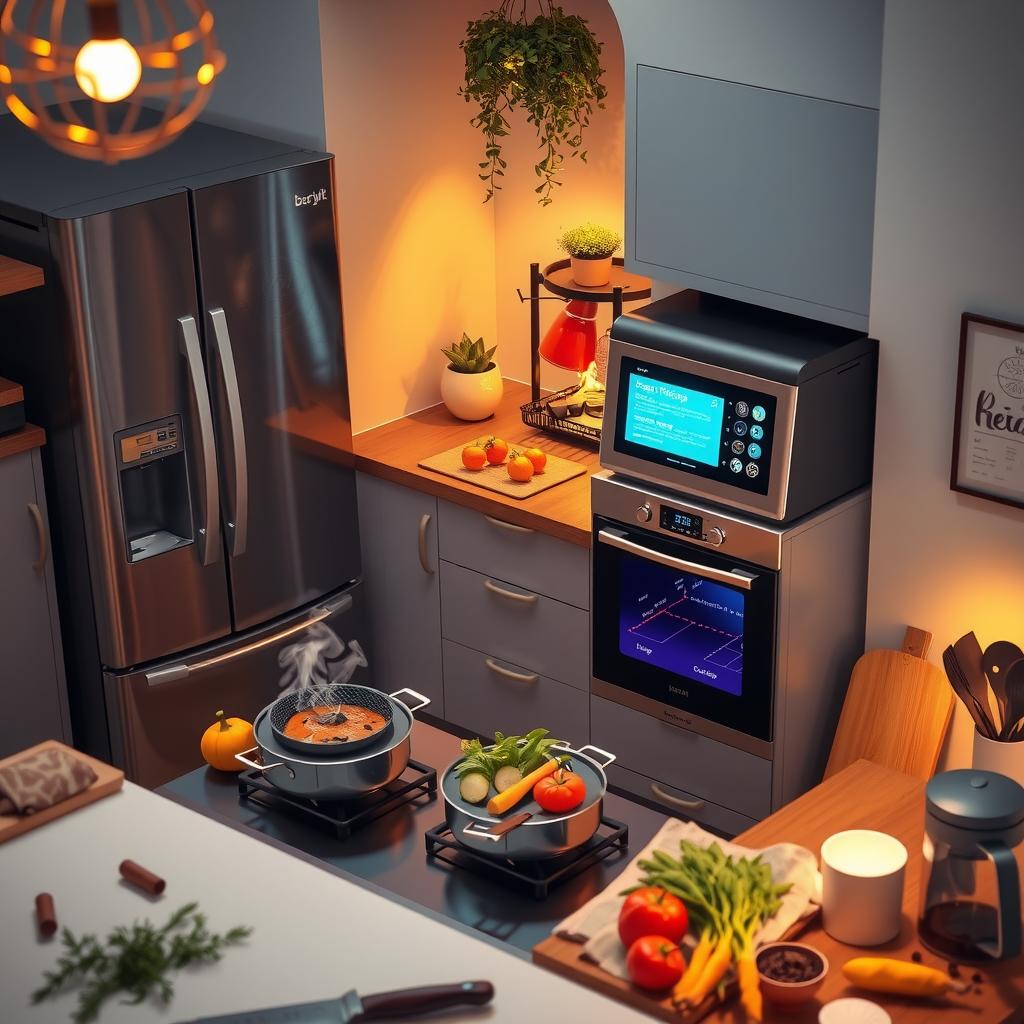
The Importance of Inventory Tracking in Modern Kitchens
Enhance Efficiency and Minimize Waste
In today’s culinary landscape, managing food supplies effectively is more crucial than ever. Smart Kitchen Appliances facilitate this process by providing cutting-edge technology that enables efficient inventory tracking. By integrating features such as connected cooking and remote control capabilities, these devices allow users to monitor their pantry items in real time. For instance, smart refrigerators can automatically track expiration dates and alert the user when items are nearing their end of life. This proactive approach not only helps maintain a well-stocked kitchen but also significantly reduces food waste—a major concern for both households and businesses alike. Furthermore, with the rise of IoT in the kitchen, home cooks can access digital inventories from anywhere via smartphones or tablets, allowing them to plan meals based on available ingredients seamlessly.
Reducing Food Waste through Smart Solutions
Sustainable Practices with Technology Integration
The benefits of smart kitchen appliances extend beyond just convenience; they play a vital role in promoting sustainability within home cooking practices. Through sophisticated inventory tracking systems embedded within smart ovens and refrigerators, users gain insights into their consumption habits over time. This data-driven approach allows individuals to make informed decisions about meal planning while ensuring that perishable goods are utilized before they spoil. Moreover, these modern cooking solutions often come equipped with recipe integration features that suggest meals based on current inventory levels—encouraging creativity while preventing unnecessary purchases that contribute to excess waste. As consumers become increasingly aware of environmental issues related to food production and waste management, embracing innovative technologies like these becomes an essential part of responsible household management.
Future-Proofing Kitchens with Smart Technology
Embracing Change for Optimal Performance
As kitchens continue to evolve thanks to advancements in technology, the implementation of smart kitchen appliances represents a significant shift towards efficiency and sustainability. The integration of inventory tracking capabilities into everyday devices exemplifies how innovation can enhance culinary experiences while addressing pressing global challenges such as food waste reduction. Home automation devices now offer functionalities like automated shopping lists generated from tracked inventories or notifications sent directly to smartphones regarding stock levels—all designed for optimal performance without added complexity for users looking for simplicity amid busy lifestyles. Additionally, utilizing connected cooking techniques fosters collaboration among family members by making shared meal preparation easier than ever before; everyone can contribute ideas based on what’s available at any given moment thanks again due largely thanks due largely because we have harnessed advances made possible through IoT applications specifically tailored toward enhancing our daily routines around eating at home efficiently!
Seamless Integration of Cooking and Technology
The Future of Meal Preparation at Your Fingertips
In the age of Smart Kitchen Appliances, cooking has transformed into a highly convenient activity thanks to the integration of advanced technology. With features like remote control capabilities, individuals can effortlessly manage their kitchen tasks from virtually anywhere. This innovation allows users to preheat their smart ovens while commuting home or adjust cooking times directly from a smartphone app, ensuring that meals are always perfectly timed. Furthermore, connected cooking is revolutionizing how recipes are approached; with just a few taps, one can access an extensive database of recipes tailored to available ingredients via their smart refrigerators. Such inventory tracking systems not only minimize food waste but also maximize efficiency by suggesting meals based on what’s currently in stock.
Recipe Integration: A Culinary Game Changer
Elevating Home Cooking with Personalized Suggestions
The recipe integration feature embedded within many Smart Kitchen Appliances gives users unprecedented control over meal planning and preparation. By simply scanning barcodes or utilizing voice commands linked to virtual assistants, these devices can recommend personalized recipes based on dietary preferences and ingredient availability. For instance, if someone discovers they have leftover chicken in the fridge, their smart coffee maker’s companion app may suggest a variety of dishes that utilize it creatively—ranging from stir-fries to gourmet salads. This seamless interaction between different home automation devices not only enhances culinary creativity but also promotes healthier eating habits as families engage more actively in meal preparation.
Remote Control Features: Convenience Redefined
Managing Meals Effortlessly from Anywhere
With the advent of IoT in the kitchen through cutting-edge Smart Kitchen Appliances, managing meal preparations has never been easier for busy households. These appliances come equipped with remote control features that enable users to monitor and adjust settings regardless of location. Whether it’s starting dinner while stuck in traffic or scheduling breakfast ahead for family members still asleep, this flexibility brings peace-of-mind along with significant time savings each day. Moreover, smart refrigerators equipped with cameras allow consumers to check inventories remotely—a game-changer for last-minute grocery runs or spontaneous dinner plans without ever stepping into the store unprepared.
Modern Cooking Solutions: Smart Choices for Every Home
Transforming Daily Routines Through Intelligent Design
The evolution towards modern cooking solutions is evident as more homes embrace innovative technologies found within today’s Smart Kitchen Appliances. From app-controlled slow cookers that adapt temperatures based on user input throughout the day to precision-guided air fryers capable of producing restaurant-quality meals at home—all these advancements reflect an ongoing commitment toward optimizing everyday routines without sacrificing quality or taste. As consumers increasingly prioritize convenience alongside health-conscious choices in their diets, investing in these intelligent devices becomes essential—not merely enhancing functionality but redefining traditional culinary practices entirely.
Embracing New Trends: The Rise Of Connected Cooking
Enhancing User Experiences Through Collaboration
As connected cooking continues its upward trajectory among enthusiasts and novices alike alike through various platforms tied into existing kitchen technology infrastructure such as smartphones or tablets—the result is greater collaboration across all aspects involved during food preparation processes thanks largely due advances made possible by interconnectedness offered via modern-day applications present today! In conclusion , embracing innovations amongst leading industry players results ultimately leads towards improved experiences facilitating enjoyable moments spent together around tables where shared memories form lasting bonds nurtured over delicious meals crafted harmoniously using integrated tools provided graciously our trusty companions known fondly as our beloved Smart Kitchen Appliances.
As the culinary landscape evolves, Smart Kitchen Appliances are at the forefront of revolutionizing cooking experiences. These devices incorporate advanced kitchen technology, allowing users to manage their meals with unprecedented ease and efficiency. For instance, smart refrigerators equipped with inventory tracking can help users keep tabs on food items, reducing waste and ensuring that ingredients are always available when needed. This feature not only saves time during meal prep but also encourages healthier eating habits by making fresh produce more accessible.
Another significant advancement is found in smart ovens, which offer precise temperature control and remote monitoring capabilities through connected cooking applications. Users can easily preheat their oven or adjust settings from anywhere using their smartphones, a game-changer for those juggling busy schedules. Furthermore, these ovens often come integrated with recipe platforms that guide users step-by-step through complex dishes, enhancing creativity while minimizing the risk of error in modern cooking solutions.
In addition to refrigeration and baking innovations, smart coffee makers have also transformed morning rituals into seamless experiences. With remote control features enabled by IoT in the kitchen, coffee enthusiasts can set brewing times or adjust strengths without being physically present in the kitchen. This level of convenience elevates daily routines and exemplifies how home automation devices contribute to a more enjoyable culinary experience.
Common Questions:
Q: How do smart kitchen appliances improve my cooking?
A: Smart kitchen appliances enhance cooking by offering features like inventory tracking for ingredient management, remote control for easy adjustments from afar, and recipe integration that guides you through meal preparation.
Q: Can I use smart kitchen appliances if I don’t have a smart home setup?
A: Yes! While they integrate seamlessly within a smart home environment using IoT technology, many smart kitchen appliances still function independently without requiring extensive home automation systems.
Q: What types of recipes can I access with my smart oven?
A: Most modern smart ovens connect to various recipe apps that provide thousands of recipes ranging from simple snacks to gourmet meals tailored specifically for your appliance’s capabilities.
